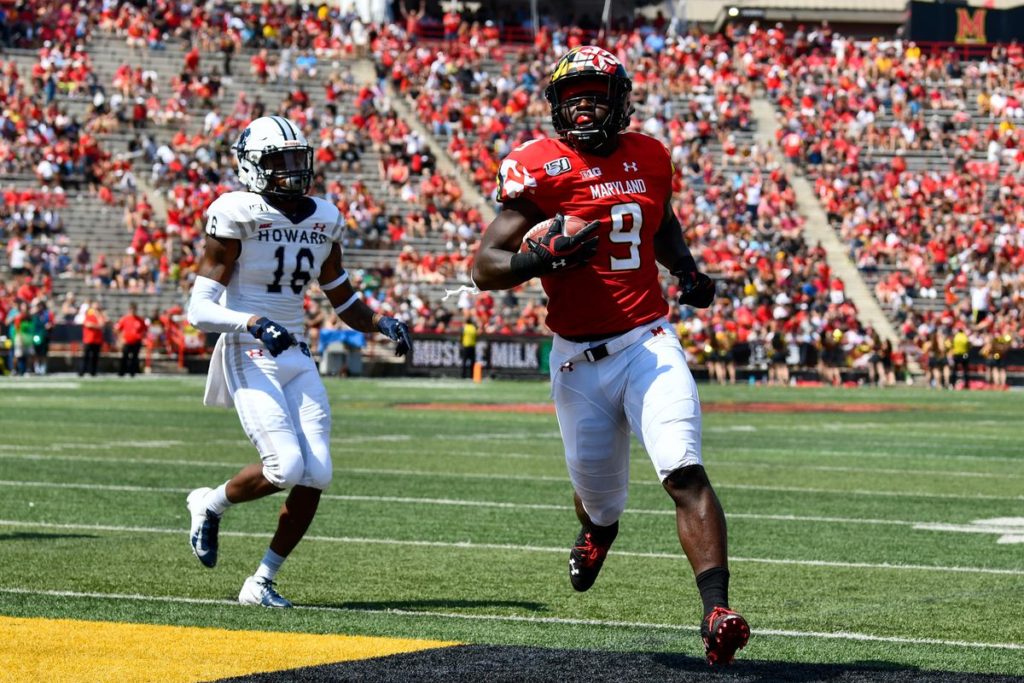Poundings for paydays put college football in ugly spot

By DERON SNYDER (as published in The Washington Times)
Mike Locksley passed his first big test as Maryland’s head football coach: He didn’t get UNLV’d.
The Terrapins played host to Howard over the weekend and pounded the visitors in a 79-0 season-opening rout. UNLV likely anticipated a similar breeze when it hosted Howard in Week 1 two years ago. Instead, the Bison pulled off a historic, 43-40 upset that garnered national attention and helped freshman quarterback Caylin Newtown emerge from his older brother’s shadow.
As if losing to a 45-point underdog wasn’t enough humiliation, UNLV also cut a $600,000 check for Howard’s troubles. Conversely, Maryland paid the Bison only $350,000 to make their 25-minute commute from D.C.
Both of those “guarantee” games amount to peanuts in college football’s grand scheme. USA Today, in a recently published rundown of appearance fees for more than 250 games involving at least one Football Bowl Subdivision school this season, reports that $150 million will change hands.
Some of those games involve one FBS school against another, ostensibly fair matchups like Oregon-Auburn ($3.5 million apiece from the promoter) and California at Mississippi ($450,000 to the visitors). But other contests are pure “payday” games, in which FBS schools invite Football Championship Subdivision foes to campus for an expected drubbing.
No other Week 1 tilt was as spectacularly lopsided as Maryland-Howard, but some honorable mentions are in order.
Texas A&M beat Texas State, 41-7, with the losers collecting $1.3 million. Florida A&M outperformed its contract, pocketing a mere $370,000 for a 62-0 stomping at Central Florida. For peak revenue while maintaining respectability, the winner was Kent State, which took home a cool $1.5 million for a 30-7 loss at Arizona State.
This year’s Backfire Award goes to 25-point favorite Tennessee. The Volunteers paid Georgia State $950,000 and suffered a 38-30 loss in front of 86,000 stunned fans.
Such upsets are the dream for FCS teams. But their administrators seek dollars, not W’s, when scheduling guarantee games against Power 5 schools. That money goes a long way for athletic departments that otherwise struggle to cover expenses. It also produces a trickle-down effect, allowing fiscally strapped institutions to use their limited resources in other areas.
“I do not see a time when we will not play these games,” Charles McClelland, commissioner of the Southwestern Athletic Conference, told The Athletic last week.
The range of benefits throughout an athletic department is obvious, from uniforms and equipment to facilities and travel. Costs are a little harder to calculate, but they range from morale to physical injury for overmatched players.
Differences in size, speed and strength are dangerous – and impossible to ignore – when Power 5 schools line up against lower-level opponents for four quarters. Even when matches don’t result in catastrophic injury – like the fractured vertebrae Southern University’s Devon Gales suffered against Georgia in 2015 – they can leave the weaker team compromised in upcoming games.
It’s also fair to reconsider what FBS schools gain by punching below their weight.
Yes, they receive revenue from a home gate and an almost certain step toward bowl eligibility. But does whipping Howard help Maryland compete against Ohio State and Michigan? If being a factor in your league is the ultimate goal, facing high-quality non-conference foes might be a better approach.
Duke didn’t offer much resistance Saturday against Alabama, losing 42-3. But at least both schools play in the FBS. I understand that the Crimson Tide needs to fill its schedule and seeks injury-free gimmes toward the end of the Southeastern Conference grind. However, coach Nick Saban should find more Duke-like, FBS patsies, instead of paying Western Carolina $525,000 for a Nov. 12 visit.
“I’ve always said, ‘Let’s play all Power 5 games,” Saban told ESPN last month. “I was in the NFL where we played all the games against NFL teams. But let’s play at least 10 Power 5 games. That would be better for the players, better for the fans, and I think you wouldn’t have to worry that if you lost a game that you wouldn’t have as much of a chance to still be in [the College Football Playoff]. They talk about strength of schedule now, but how do you really evaluate that?”
I don’t know.
Under the current system, it might be margin of victory divided by size of payout.
— Brooklyn-born and Howard-educated, Deron Snyder writes his award-winning column for The Washington Times on Tuesdays and Thursdays. Follow him on Twitter @DeronSnyder.
 Follow
Follow
